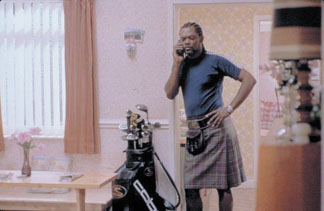Formula 51
Filth and Fury Signifies Nothing
By Patrick Reed

“A 10:30 tee time is no good. I’ve got drugs to sell by 4pm.”
Oh, remember the mid-90s, movie fans? Hollywood was churning out mostly dreadful crap, as it seemingly always has, but for a while there, some young up-and-comers were energizing the independent film scene with features that pulsated with a love of pop culture and proudly played with narrative conventions and formal cinematic technique. Two of the best were 1994's Pulp Fiction from the States and 1996's U.K. import Trainspotting. Let's review their similarities: both celebrated a life of crime as the pinnacle of modern existence, both assembled a roster of unique characters supplied with witty, cutting dialogue, both repeatedly used violence for comic effect, and both compiled inventive, hip musical soundtracks. Pulp and Trainspotting were therefore two of the most influential movies of their time, and this influence continues even today. That's not a good thing; for as Formula 51 proves, the law of diminishing returns has taken a crippling toll on what once was considered cool.
Formula 51 originated in the U.K., released nearly a year ago as The 51st State. The film's backstory reveals that the first-time screenwriter, Stel Pavlou, is a working-class hero of sorts who realized his dreams by getting his script made. What's more, the producers nabbed two of the most memorable stars from Pulp Fiction and Trainspotting to star. Reflect for a minute and remember where Samuel L. Jackson's career was before he played jheri-curled philosopher hitman Jules Winnfield in Pulp, and then see where he's gone since (or, rather, where hasn't he gone?). Likewise, Robert Carlyle's absolutely mesmerizing thug Francis Begbie in Trainspotting helped land the talented scrapper choice roles in the crowd-pleasing The Full Monty and as a Bond villain in The World Is Not Enough. Add hotshot Hong Kong action director Ronny Yu to the mix, and enough ingredients are in place to stir up appreciable anticipation. How can it go wrong?
Well, the first clue that this is going to be nothing more than a compendium of worn-out clichés is in the prologue, where in 1971, recent pharmacology graduate Elmo McElroy (Jackson) drives down the Pacific Coast Highway decked out in a dashiki and Dr. J. afro, listening to soul music on the 8-track and smoking a huge joint. He gets pulled over and busted by an uptight white patrolman, and we then jump to 2001, where McElroy's the chief chemist for a Los Angeles drug lord called "the Lizard" (Meat Loaf, bursting with extra ham). McElroy double-crosses the Lizard and sets off a massive explosion in the lab before departing the U.S. to sell the wonder pill he's been working on (called P.O.S. 51) to a connection in Liverpool. Problem is, the Lizard survived the blast, and has dispatched his favorite femme fatale assassin Dakota (Emily Mortimer) after McElroy. Once in the Beatles' hometown, McElroy is paired up with local enforcer Felix De Souza (Carlyle) to watch his back until the deal can be made. Suffice to say that Dakota, some crooked cops, and a plethora of Merseyside lowlifes all quickly scuttle McElroy's best-laid plans, forcing he and De Souza to ally against all comers in a last-ditch attempt to unload what McElroy maintains is a drug formula that provides an effect 51 times that of cocaine, LSD, and ecstasy combined.
Let's seeElmo, Felix De Souza, Dakota, "the Lizard"-aren't the names evidence enough that this film is a retread? The on-location shooting sets an appropriately gritty mood, and a couple of the action scenes are well-handled, but there is so much more that is simply tiresome, especially the by-now routine profanity and scatological humor that saturates Pavlou's script. As for the leads, Carlyle attempts to give his character a bit of complexity and tenderness as the film progresses, but Jackson sticks to his well-cultivated and stale "bad mo-fo" persona throughout (the acting chops recently utilized in Changing Lanes are nowhere to be found; and in fact this gig, where the noted golf enthusiast gets to swing a few clubs onscreen, adds further support to the growing argument that Samuel L. Jackson is the new Michael Caine, in terms of craven paycheck-cashing and squandering of talents).
Ultimately, the parties involved with Formula 51 try to place a new spin on a retro cinematic formula that at least Stateside, has died a well-deserved death (even Pulp's Quentin Tarantino matured with '97's Jackie Brown). The end result is more like a cut-rate facsimile of U.K. "it" director Guy Ritchie's Snatch, which itself was a self-plagiarism of the Madonna-mate's first-generation Pulp-Trainspotting ripoff Lock, Stock and Two Smoking Barrels. Someone should scream across the Atlantic that, just as with Britpop in music, the halcyon movie days of the mid-1990s are over.
HOME | THIS ISSUE | ACE ARCHIVES